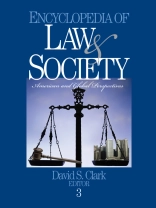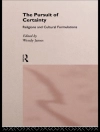‘This work will be very valuable for academic and public libraries supporting prelaw, law, social, and cultural studies. Summing Up: Highly recommended. Upper-level undergraduates through professionals/practitioners; general readers.’
—CHOICE
research on legal systems, and two, that this research is increasingly
global. As soon as you cross a jurisdictional line, even if it separates countries that are very similar, you enter a different legal system. It cannot be assumed that any particular rule, doctrine, or practice is the same in any two jurisdictions, regardless of how close these jurisdictions are, in terms of history and tradition.
The
Encyclopedia of Law and Society is the largest comprehensive and international treatment of the law and society field. With an Advisory Board of 62 members from 20 countries and six continents, the three volumes of this state-of-the-art resource represent interdisciplinary perspectives on law from sociology, criminology, cultural anthropology, political science, social psychology, and economics. By globalizing the
Encyclopedia′s coverage, American and international law and society will be better understood within its historical and comparative context.
Key Features:
- Includes more than 700 biographical entries that are historical, comparative, topical, thematic, and methodological
- Presents the rich diversity of European, Latin American, Asian, African, and Australasian developments for the first time in one place to reveal the truly holistic, interdisciplinary virtues of law and society
- Examines how and why legal systems grow and change, how and why they respond (or fail to respond) to their environment, how and why they impact the life of society, and how and why the life of society impacts in turn these legal systems
Encyclopedia reflects the paradoxical reality of modern life, including legal life. This valuable resource aims to present research, along with the theories on which it is grounded, fairly and comprehensively and is a must-have for all academic libraries.
About the author
Professor David S. Clark joined the Willamette faculty in January 2002. He is a frequent scholar at the Max Planck Institute for Comparative and International Private Law in Hamburg and has held the Alexander von Humboldt and Max Planck Society research fellowships. Clark previously taught at the universities of Colorado, Houston, Louisiana State, and Tulsa. He was also the Inns of Court Fellow at Inner Temple in London (2000), the Fulbright Chair in Comparative Law at Trento University (1999), the Wing Tat Lee Chair in International and Comparative Law at Loyola University Chicago (1996), and the Dan Hopson Distinguished Visiting Professor of Law at Southern Illinois University (1987).












